Styne
On this page, you find all documents, package deals, and flashcards offered by seller Styne.
- 532
- 0
- 8
Community
- Followers
- Following
541 items
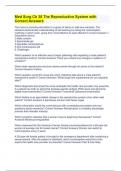
Med Surg Ch 38 The Reproductive System
The nurse is providing education to a group of teens on safe sex practices. The students demonstrate understanding of the teaching by listing the contraception methods in which order, going from most effective to least effective? Correct Answers 1. Intrauterine device 2.Male condom 3.Spermicidal gel 4.Injectable contraceptives 5.Oral contraceptive pill 6. Diaphragm Which question is an effective way to begin gathering data regarding a male patient's reproductive history? Correct Answers...
- Exam (elaborations)
- • 7 pages •
The nurse is providing education to a group of teens on safe sex practices. The students demonstrate understanding of the teaching by listing the contraception methods in which order, going from most effective to least effective? Correct Answers 1. Intrauterine device 2.Male condom 3.Spermicidal gel 4.Injectable contraceptives 5.Oral contraceptive pill 6. Diaphragm Which question is an effective way to begin gathering data regarding a male patient's reproductive history? Correct Answers...
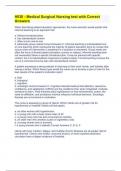
HESI - Medical Surgical Nursing
HESI - Medical Surgical Nursing HESI - Medical Surgical Nursing test HESI - Medical Surgical Nursing
- Package deal
- • 2 items •
- HESI - Medical Surgical Nursing • Exam (elaborations)
- HESI - Medical Surgical Nursing test • Exam (elaborations)
HESI - Medical Surgical Nursing HESI - Medical Surgical Nursing test HESI - Medical Surgical Nursing
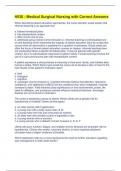
HESI - Medical Surgical Nursing
When describing patient education approaches, the nurse educator would explain that informal teaching is an approach that a. follows formalized plans b. has standardized content c. often occurs one-to-one d. addresses group needs Correct Answers C. Informal teaching is individualized one on one teaching which represents the majority of patient education done by nurses that occurs when an intervention is explained or a question is answered. Group needs are often the focus of formal patient ...
- Exam (elaborations)
- • 53 pages •
When describing patient education approaches, the nurse educator would explain that informal teaching is an approach that a. follows formalized plans b. has standardized content c. often occurs one-to-one d. addresses group needs Correct Answers C. Informal teaching is individualized one on one teaching which represents the majority of patient education done by nurses that occurs when an intervention is explained or a question is answered. Group needs are often the focus of formal patient ...
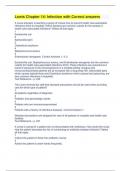
Lewis Chapter 14: Infection
A nurse educator is teaching a group of nurses how to prevent health care-associated infections (HAI) in hospitals. Which bacteria are common culprits for the spread of health care-associated infections? Select all that apply. 1 Escherichia coli 2 Salmonella typhi 3 Clostridium botulinum 4 Staphylococcus aureus 5 Enterobacter aerogenes Correct Answers 1, 4, 5 Escherichia coli, Staphylococcus aureus, and Enterobacter aerogenes are the common culprits for health care-associated ...
- Exam (elaborations)
- • 25 pages •
A nurse educator is teaching a group of nurses how to prevent health care-associated infections (HAI) in hospitals. Which bacteria are common culprits for the spread of health care-associated infections? Select all that apply. 1 Escherichia coli 2 Salmonella typhi 3 Clostridium botulinum 4 Staphylococcus aureus 5 Enterobacter aerogenes Correct Answers 1, 4, 5 Escherichia coli, Staphylococcus aureus, and Enterobacter aerogenes are the common culprits for health care-associated ...
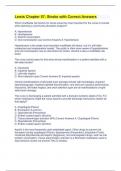
Lewis Chapter 57: Stroke
Which modifiable risk factors for stroke would be most important for the nurse to include when planning a community education program? A. Hypertension B. Hyerlipidemia C. Alcohol consumption D. Oral contraceptive use Correct Answers A. Hypertension Hypertension is the single most important modifiable risk factor, but it is still often undetected and inadequately treated. The public is often more aware of hyperlipidemia and oral contraceptive use as risk factors for stroke. Alcohol is al...
- Exam (elaborations)
- • 31 pages •
Which modifiable risk factors for stroke would be most important for the nurse to include when planning a community education program? A. Hypertension B. Hyerlipidemia C. Alcohol consumption D. Oral contraceptive use Correct Answers A. Hypertension Hypertension is the single most important modifiable risk factor, but it is still often undetected and inadequately treated. The public is often more aware of hyperlipidemia and oral contraceptive use as risk factors for stroke. Alcohol is al...
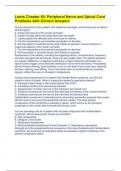
Lewis Chapter 60: Peripheral Nerve and Spinal Cord Problems
During assessment of the patient with trigeminal neuralgia, what should you do (select all that apply)? A. Inspect all aspects of the mouth and teeth. B. Assess the gag reflex and respiratory rate and depth. C. Lightly palpate the affected side of the face for edema. D. Test for temperature and sensation perception on the face. E. Ask the patient to describe factors that initiate an episode. Correct Answers A. Inspect all aspects of the mouth and teeth. D. Test for temperature and sensatio...
- Exam (elaborations)
- • 42 pages •
During assessment of the patient with trigeminal neuralgia, what should you do (select all that apply)? A. Inspect all aspects of the mouth and teeth. B. Assess the gag reflex and respiratory rate and depth. C. Lightly palpate the affected side of the face for edema. D. Test for temperature and sensation perception on the face. E. Ask the patient to describe factors that initiate an episode. Correct Answers A. Inspect all aspects of the mouth and teeth. D. Test for temperature and sensatio...
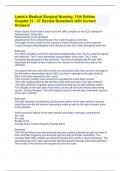
Lewis's Medical-Surgical Nursing, 11th Edition Chapter 31 - 37 Review Questions
Which aspect of the heart's action does the QRS complex on the ECG represent? Depolarization of the atria Repolarization of the ventricles Depolarization from atrioventricular (AV) node throughout ventricles The length of time it takes for the impulse to travel from the atria to the ventricles Correct Answers Depolarization from atrioventricular (AV) node throughout ventricles Rationale: The QRS recorded on the ECG represents depolarization from the AV node throughout the ventricles. Th...
- Exam (elaborations)
- • 50 pages •
Which aspect of the heart's action does the QRS complex on the ECG represent? Depolarization of the atria Repolarization of the ventricles Depolarization from atrioventricular (AV) node throughout ventricles The length of time it takes for the impulse to travel from the atria to the ventricles Correct Answers Depolarization from atrioventricular (AV) node throughout ventricles Rationale: The QRS recorded on the ECG represents depolarization from the AV node throughout the ventricles. Th...
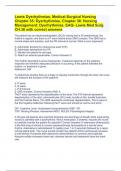
Lewis Dysrhythmias, Medical-Surgical Nursing Chapter 35: Dysrhythmias, Chapter 36: Nursing Management: Dysrhythmias, EAQ- Lewis Med Surg CH.36,
The patient has an electrocardiographic (ECG) tracing that is 50 beats/minute, the rhythm is regular, and there is a P wave before every QRS complex. The QRS has a normal shape and duration, and the PR interval is normal. What is your response? A. Administer atropine by intravenous push (IVP). B. Administer epinephrine by IVP. C. Monitor the patient for syncope. D. Attach an external pacemaker. Correct Answers C The rhythm described is sinus bradycardia. Treatment depends on the patient...
- Exam (elaborations)
- • 60 pages •
The patient has an electrocardiographic (ECG) tracing that is 50 beats/minute, the rhythm is regular, and there is a P wave before every QRS complex. The QRS has a normal shape and duration, and the PR interval is normal. What is your response? A. Administer atropine by intravenous push (IVP). B. Administer epinephrine by IVP. C. Monitor the patient for syncope. D. Attach an external pacemaker. Correct Answers C The rhythm described is sinus bradycardia. Treatment depends on the patient...
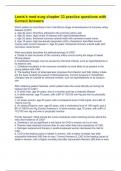
Lewis's med-surg chapter 33 practice questions
Which patient is most likely to be in the fibrous stage of development of coronary artery disease (CAD)? a. Age 40 years, thrombus adhered to the coronary artery wall b. Age 50 years, rapid onset of disease with hypercholesterolemia c. Age 32 years, thickened coronary arterial walls with narrowed vessel lumen d. Age 19 years, high low-density lipoprotein (LDL) cholesterol, lipid-filled smooth muscle cells Correct Answers c. Age 32 years, thickened coronary arterial walls with narrowed vessel...
- Exam (elaborations)
- • 10 pages •
Which patient is most likely to be in the fibrous stage of development of coronary artery disease (CAD)? a. Age 40 years, thrombus adhered to the coronary artery wall b. Age 50 years, rapid onset of disease with hypercholesterolemia c. Age 32 years, thickened coronary arterial walls with narrowed vessel lumen d. Age 19 years, high low-density lipoprotein (LDL) cholesterol, lipid-filled smooth muscle cells Correct Answers c. Age 32 years, thickened coronary arterial walls with narrowed vessel...
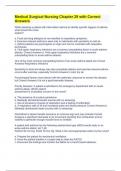
Medical Surgical Nursing Chapter 29
While assisting a patient with intermittent asthma to identify specific triggers of asthma, what should the nurse explain? a. Food and drug allergies do not manifest in respiratory symptoms. b. Exercise-induced asthma is seen only in individuals with sensitivity to cold air. c. Asthma attacks are psychogenic in origin and can be controlled with relaxation techniques. d. Viral upper respiratory infections are a common precipitating factor in acute asthma attacks. Correct Answers d. Viral u...
- Exam (elaborations)
- • 16 pages •
While assisting a patient with intermittent asthma to identify specific triggers of asthma, what should the nurse explain? a. Food and drug allergies do not manifest in respiratory symptoms. b. Exercise-induced asthma is seen only in individuals with sensitivity to cold air. c. Asthma attacks are psychogenic in origin and can be controlled with relaxation techniques. d. Viral upper respiratory infections are a common precipitating factor in acute asthma attacks. Correct Answers d. Viral u...
